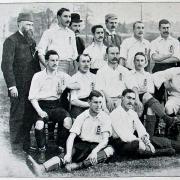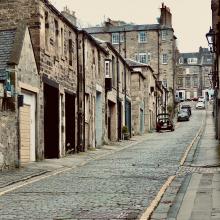
EDINBURGH STUDENTS FINED.—
In Edinburgh Police Court yesterday, before Bailie Gibson, Henry Eustace Cross (25), 21 Hillside Street; Andrew Whitehead (24), 63 Montgomery Street, two veterinary students, were charged with creating a disturbance outside the Ship Hotel, East Register Street, on Monday, shouting and swearing, and collecting a crowd.
The accused pleaded guilty, and according to the statement of the Prosecutor, they were under the influence of drink, and were endeavouring to get into the hotel. Although warned about their conduct, they refused to desist, and were accordingly arrested. The accused Whitehead explained that the whole matter arose out of an argument over the international football match.[1]

The Magistrate, after commenting on the seriousness of the offence, imposed a fine on each of £1, the alternative being fourteen days’ imprisonment. A similar penalty was inflicted on other three veterinary students named Patrick O’Kane (22), 21 Sloan Street; Joseph Welsh (26), 15 East London Street, who also pleaded guilty to creating a disturbance in the Ship Hotel on Monday, using obscene language, and refusing to leave the hotel.
Scotsman, 4 March 1903
[1] On 2 March 1903, England beat Wales 2–1 in the British Home Championship. Image of England football team, 1893, Wikipedia, last accessed 16.12.20.
*****
EDINBURGH TOWN COUNCIL.
[…]
THE IMPROVEMENTS AT GREENSIDE.

The Improvements Committee recommended reconstruction of a number of small houses at Greenside. Judge Brown said that as this was the first opportunity the Improvements Committee had of reporting anything in connection with this scheme at Greenside, he thought it might be desirable very shortly to state the condition in which it at present stood.
It was quite true there had been considerable time taken before they were able to report, but it was gratifying to be able to state that the whole settlements which had been made had resulted in a considerable saving to the city, and while a considerable number of cases went to the arbiter, there was only one finally decided by him. And when he stated that the claimant claimed £2000, and the arbiter only awarded £430, he thought they would agree that they were amply justified in letting that one go before the arbiter. (Hear, hear.)
Several parts had been withdrawn from the scheme and arrangements made, and the committee had reinstated several. The scheme, if they left out Greenside Place, might be stated broadly as being adjusted with the parties, and they thought the time had now come when they ought to begin certain improvements brought before them to-day.
This consisted of dealing with the three under flats of Blenheim Place. It was proposed to reconstruct these flats and then to make 12 houses of single apartments, and they would observe the rooms were very large rooms. The rental it was proposed would be 2s 9d per week. He was glad to state that after allowing for factorage, taxes, and payment of interest, there would be, if the work was done at the estimated cost of £550, a sufficient sum to pay the charge in 32 years.
Mr Stevenson asked if the rent proposed was not larger than other cases. Judge Brown said it was quite true that there were one-roomed houses at a less rent, but there was not a one-roomed house with this cubic capacity at a less rent.

Mr Stewart asked if this scheme would in any way interfere with the proposed plan of the reconstruction of Greenside. Judge Brown said it was an impossibility to deal with the scheme as a whole. They must, in terms of the arrangement made, do it piecemeal. This was providing accommodation for 12 families who would be transferred from some of the other houses. It was not proposed that any tenant, with the exception of those people residing in the immediate district would get these houses.
PLAYING WITH THE COUNCIL’S TIME.
Mr Balfour asked if they were going to allow tenants to put up pictures to brighten up their one-roomed houses. The people in Portobello were delighted with their houses, but they had a grievance. It was all very well for Mr Menzies to cry “Next business.” He could stick up as many pictures as he liked. Mr Menzies: This is playing with the time of the Council. Judge Brown said he had seen pictures in several of their houses, and the Portobello people would be allowed to put up pictures if they liked.
Mr Welsh desiring a printed report, Judge Brown said that if the economical members desired a report on every matter of £550, the committee would not object, but it would mean time and money. They were asked to approve the expenditure of £550, there would be 12 houses provided, and a return of 5 per cent. He did not know that any intelligent member of the Council required anything more. (Hear, hear, and laughter.)[2]

Mr Stewart said he was disappointed that the scheme was being taken up piecemeal. His understanding was that the property would be scheduled for clearance, and that reconstruction could take place from top to bottom.
Mr Dobie said he was pleased with the proposal; although there was a much larger scheme in the future this did not interfere with the main portion.
Bailie Cameron remarked that he had spent an afternoon going over the property with Judge Brown, and it had been well styled a warren of crime and disease. Judge Brown had a complete scheme of dealing with Greenside, but there were so many different claims to be made up that he was taking out the worst.

Mr Mitchell, taking exception to the provision of 12 single roomed houses, suggested that a portion of the scheme should have been double-roomed houses.[3] Sir Andrew M’Donald regretted that Mr Mitchell had not looked into the committee meeting for five minutes. The best was being done, and Judge Brown was to be thanked for the time and labour he was giving to the scheme. (Hear, hear.) He could not understand how, when they made attempt to do something for the very poor, they always got a number of severe economists trying to stop them, men who outside by their speeches made out that they were trying to do everything they could to elevate these people. The proposal was then approved.
Edinburgh Evening News, 10 March 1903
[2] M-LJ (13.3.03) noted, ‘Councillor Welsh for once in a way was silenced. […] “I don’t know,” added the Convener with sarcastic emphasis, “that any intelligent member of the Council requires more.” The sentence was punctuated with the loud laughter of the Council, and the enquirer had not a word to say.’
[3] Ibid.: ‘Councillor Mitchell awakened the astonishment of the Judge by his strictures upon the provision of so many one-roomed houses in one tenement, and there is nobody in the Council can convey so much meaning in his tones as the Convener of the Improvement Committee. In fact, his outburst of “I am considerably surprsed at what Councillor Mitchell has added,” was so emphatic that it seemed to require no further remark to convey the same impression to the Councillors, but the Judge went on to affirm that the Councillor must know that there were numerous cases of 16 families being in one tenement, and if he had looked at the plan he would have seen that twelve families were to be accommodated—not in one tenement but two.’
*****
CITY OF EDINBURGH
________
DEMOLITION OF OLD PROPERTIES
________
The MAGISTRATES and COUNCIL of the CITY of EDINBURGH invite TENDERS for the DEMOLITION of OLD PROPERTIES and MAKING UP of GROUND at GILCHRIST LANE, GILCHRIST ENTRY, QUEEN’S PLACE and GREENSIDE END, all situated in the Greenside Improvement Area.
Copies of Tender, Specification of Work, and all information may be obtained from the Burgh Engineer, 1 Parliament Square.
Sealed Tenders, endorsed “Demolition of Old Properties, Greenside Areas, D & G,” must be lodged with the Subscriber by 10 a.m. on Tuesday, the 24th current.
The Magistrates and Council do not bind themselves to accept the lowest or any of the Tenders.
THOMAS HUNTER, W.S., Town Clerk[4]
Mid-Lothian Journal, 20 March 1903
[4] See M-LJ (18.11.1904). Maps: Ordnance Survey, 1901. large-scale Scottish town plan, surveyed 1893–94, reproduced by permission of the National Library of Scotland.
*****
FOOTBALL.

EAST OF SCOTLAND ASSOCIATION.—A meeting of the East of Scotland Association was held last night at 1 West Register Street, Edinburgh—Mr J. Nisbet presiding.
Charles Liddell, Bo’ness, was censured for having kicked a Bathgate Amateur player.
In regard to the Cowdenbeath v. Hibernian Shield tie at Cowdenbeath, Mr J. Nisbet, the referee, reported that when he was leaving the field a number of boys, who were dissatisfied with his decisions, threw turfs at him. There was no official or policeman to lend him a hand, but on the other hand, Mr Hardie (Cowdenbeath) stated that he got the the assistance of the officials. By the casting vote of the chairman it was agreed to warn the Cowdenbeath Club to take measures for the protection of referees. […]
Edinburgh Evening News, 26 March 1903



